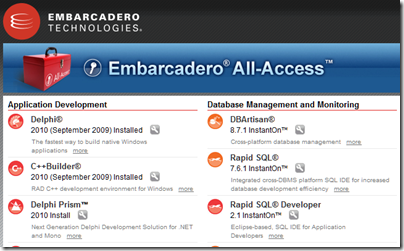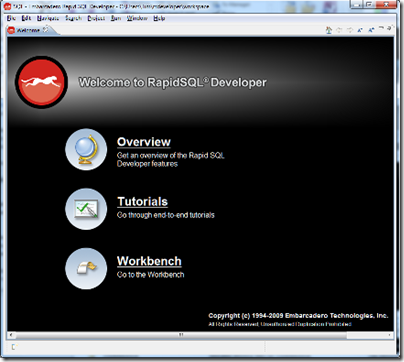Embarcadero has announced the AppWave Store, a forthcoming app store for Windows which uses application virtualization to avoid the hassles and risks of the usual Windows install process.
The idea is that purchasing apps for Windows will be as simple as installing an app on a mobile using the Apple app store or Android Market.
The underlying technology was developed to simplify deployment of Embarcadero’s tools. The All-Access subscription includes a tool box application that lets you run tools using “InstantOn”, which means no installation, just click and run. I have used this for a while now and it works well.
When you run an InstantOn tool for the first time, you are prompted to download:
There is of course a pause while the app downloads. This is not thin client technology where the app actually runs remotely. It is installed on your local machine, but isolated so there are no dependencies or conflicts.
Once downloaded, you just launch the application. No other setup, other than software agreement and registration prompt.
The download is cached, so you can launch next time without delay, and it works offline too. AppWave is a rebranded version of InstantOn, and is also available for internal deployment of Embarcadero tools.
The AppWave store takes this technology and applies to a store for the general public. Developers will pay $99 per year (though the fee is waived if you sign up now) and get AppWave Studio, which lets you convert software to run under AppWave. The conversion process is called “mastering” and only takes a few hours, according to the FAQ [pdf].
Windows XP, Vista and 7 are supported clients, availability will be worldwide at launch, and Embarcadero takes 30% of your sale price. No launch date has been announced.
I guess the first big issue is whether developers will feel that the 30% fee is good value bearing in mind that there are many other ways to sell and deploy software.
Second, there are other app stores out there or coming, not least Microsoft’s own which is likely to be part of Windows 8. Will AppWave compete effectively?
Third, does Embarcadero have what it takes to market AppWave and make a destination for Windows users looking for apps?
App virtualization is a neat trick though, and could save significant support costs as well as being appealing for customers. Deploying apps using runtimes like Silverlight or Adobe AIR can be equally seamless, but apps have to be written specifically for those runtimes, whereas AppWave works with apps written for the full Windows API.
It is surprising that Embarcadero is not also marketing the AppWave technology for developers for general purpose use. Possibly this is coming; or maybe the company will try to keep it as an exclusive benefit for the AppWave store. There are alternatives, including Microsoft App-V and VMWare ThinApp.
See also Marco Cantu’s post Understanding Embarcadero AppWave, which is what alerted me to the AppWave store.




